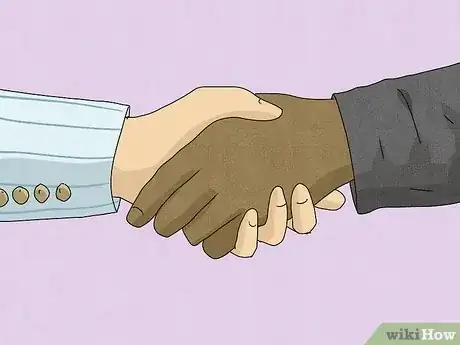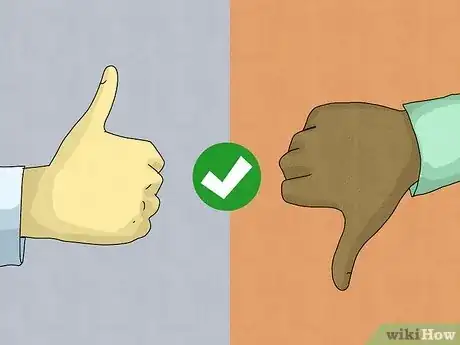This article was co-authored by Liana Georgoulis, PsyD and by wikiHow staff writer, Glenn Carreau. Dr. Liana Georgoulis is a Licensed Clinical Psychologist with over 10 years of experience, and is now the Clinical Director at Coast Psychological Services in Los Angeles, California. She received her Doctor of Psychology from Pepperdine University in 2009. Her practice provides cognitive behavioral therapy and other evidence-based therapies for adolescents, adults, and couples.
There are 11 references cited in this article, which can be found at the bottom of the page.
wikiHow marks an article as reader-approved once it receives enough positive feedback. In this case, several readers have written to tell us that this article was helpful to them, earning it our reader-approved status.
This article has been viewed 340,275 times.
You might be wondering how you can avoid conflict, especially in the workplace, but the better question is: how can you manage it? Conflict is a natural part of life, but you can overcome it with compassion and respect. Keep reading for a comprehensive guide to managing conflict. Once you know how to solve conflicts, you'll see them as an opportunity for change and better communication—whether with yourself or others!
Things You Should Know
- Identify the source of the conflict first. This will help you reflect on the problem, brainstorm solutions, and come up with a plan to resolve things.
- Stay calm no matter what. Listen to the other person before sharing how you feel about the situation and use neutral language to keep things civil.
- Come up with multiple solutions and work together to compromise and forgive each other. You might agree to disagree or ask a third party for help.
Steps
Community Q&A
-
QuestionMy friend spread rumors about me since I cried after somebody in my group insulted me multiple times. What do I do?
 wikiHow Staff EditorThis answer was written by one of our trained team of researchers who validated it for accuracy and comprehensiveness.
wikiHow Staff EditorThis answer was written by one of our trained team of researchers who validated it for accuracy and comprehensiveness.
Staff Answer wikiHow Staff EditorStaff AnswerConfront your friend in a calm, civil manner about the rumors. Talk to them earnestly about why they spread the rumors and how those rumors made you feel without becoming accusatory or angry. You could say, "It really hurt my feelings to hear those rumors being spread about me. Can you help me understand why they were started in the first place?"
wikiHow Staff EditorStaff AnswerConfront your friend in a calm, civil manner about the rumors. Talk to them earnestly about why they spread the rumors and how those rumors made you feel without becoming accusatory or angry. You could say, "It really hurt my feelings to hear those rumors being spread about me. Can you help me understand why they were started in the first place?" -
QuestionWhat if the other party doesn't want to resolve the conflict intentionally? How to deal with such a situation?
 wikiHow Staff EditorThis answer was written by one of our trained team of researchers who validated it for accuracy and comprehensiveness.
wikiHow Staff EditorThis answer was written by one of our trained team of researchers who validated it for accuracy and comprehensiveness.
Staff Answer wikiHow Staff EditorStaff AnswerYou can't force someone to resolve a conflict, but you can directly tell them that you'd like to put the conflict behind you. Let them know that you're willing to talk over the situation in a fair, nonjudgmental way and you'd very much appreciate hearing their perspective on the situation too. If they understand that your main goal is to resolve the situation in a way that satisfies both of you as much as possible, they might be willing to cooperate.
wikiHow Staff EditorStaff AnswerYou can't force someone to resolve a conflict, but you can directly tell them that you'd like to put the conflict behind you. Let them know that you're willing to talk over the situation in a fair, nonjudgmental way and you'd very much appreciate hearing their perspective on the situation too. If they understand that your main goal is to resolve the situation in a way that satisfies both of you as much as possible, they might be willing to cooperate. -
QuestionWhat is a manager's role in managing conflict?
 Community AnswerThis would be a question for your supervisor or Human Resources department. They will be able to guide you on what the company’s policies are on managing office conflicts. Most Human Resources personnel are trained in doing so, and some companies have a dedicated person to help. Many HR departments also offer manager training with focus on employee conflict.
Community AnswerThis would be a question for your supervisor or Human Resources department. They will be able to guide you on what the company’s policies are on managing office conflicts. Most Human Resources personnel are trained in doing so, and some companies have a dedicated person to help. Many HR departments also offer manager training with focus on employee conflict.
References
- ↑ https://www.ohsu.edu/school-of-medicine/mentoring/resolving-conflict
- ↑ https://www.edmonds.edu/counseling/documents/Conflict.pdf
- ↑ https://extension.okstate.edu/fact-sheets/negotiation-strategies.html
- ↑ https://www.canr.msu.edu/news/what_did_you_say_the_importance_of_being_an_active_listener
- ↑ https://www.edmonds.edu/counseling/documents/Conflict.pdf
- ↑ https://teaching.cornell.edu/resource/getting-started-managing-classroom-conflict
- ↑ https://teaching.cornell.edu/resource/getting-started-managing-classroom-conflict
- ↑ https://www.police.uci.edu/how-do-i/_brochures/conflict_management.pdf
- ↑ https://www.clarke.edu/campus-life/health-wellness/counseling/articles-advice/tips-for-managing-conflict/
- ↑ https://www.helpguide.org/articles/relationships-communication/conflict-resolution-skills.htm
- ↑ https://www.helpguide.org/articles/relationships-communication/conflict-resolution-skills.htm
- ↑ https://www.pon.harvard.edu/daily/conflict-resolution/trying-to-forgive-and-move-forward/
- ↑ https://www.fao.org/3/a0032e/a0032e06.htm
- ↑ https://www.helpguide.org/articles/mental-health/emotional-intelligence-at-work.htm
About This Article
To manage conflict, start by clearly identifying the issues so you can articulate your concerns. Then, identify the main individuals involved so that you're communicating with the right people to resolve the problem. Once you know the cause and who to talk to, let the others involved know how you feel, what the specific problem is from your perspective, and the impact it is having on you. Be calm and use neutral language to avoid fanning the flames in a heated moment. After you communicate your thoughts, give the others the same opportunity and really listen to their answers. Now that everything is out on the table, you can all work together to resolve the issue in an informed way. For more tips on resolving conflicts peacefully, read on!












































































